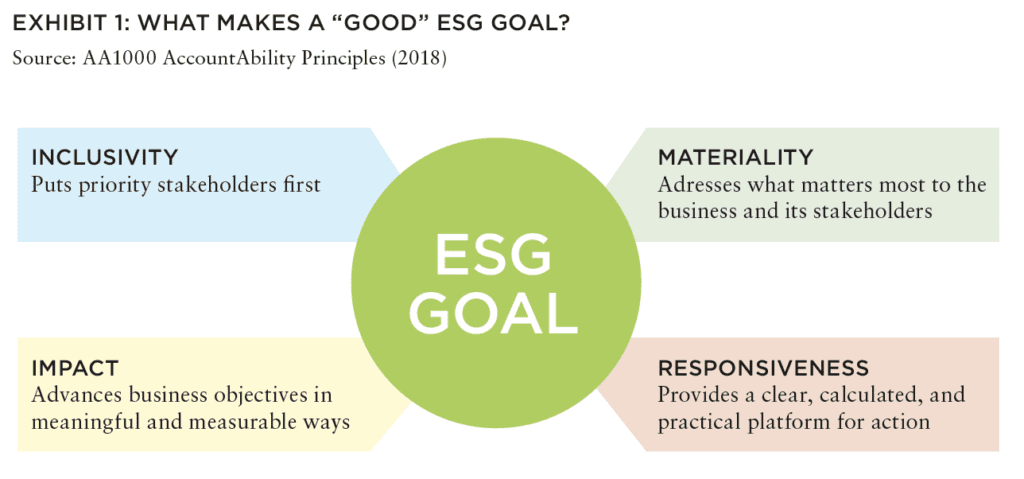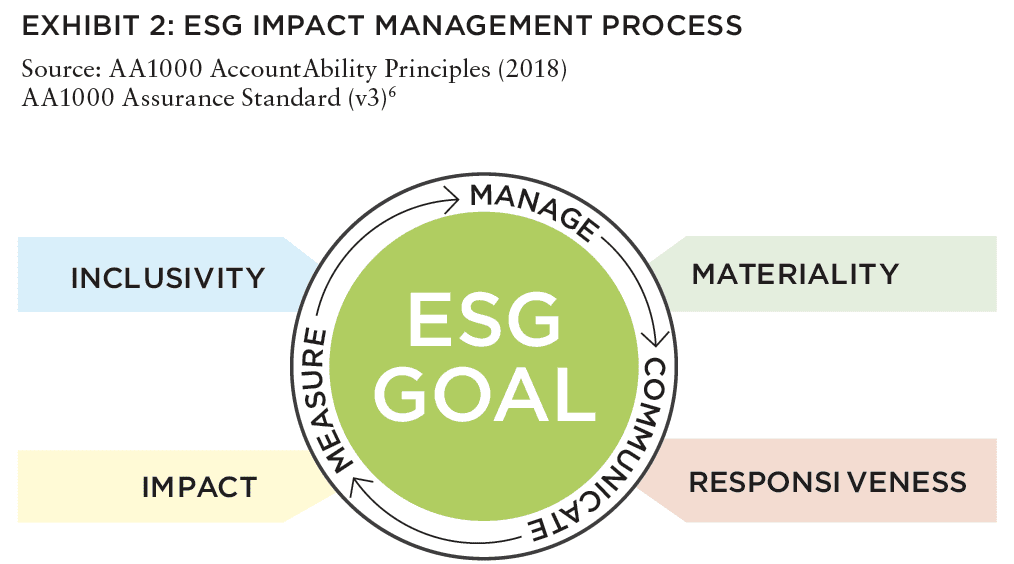During a time of unprecedented uncertainty and disruption, how should businesses approach the “new metrics of performance,” and how will ESG evolve in 2021?
We are in a time of unprecedented uncertainty and disruption, as the pandemic, in particular, is posing unique challenges for all businesses for how their employees work, how clients behave, how supply chains function, and how to confront the “new metrics of performance.”
Business performance, in today’s terms, transcends profits and losses and incorporates a broader focus on “Corporate Purpose.” This shift from shareholder to stakeholder capitalism was asserted through the Business Roundtable’s 2019 statement on the Purpose of a Corporation affirming “the essential role corporations can play in improving our society when CEOs are truly committed to meeting the needs of all stakeholders.”[1]
Larry Fink, CEO of Blackrock, has reinforced this concept of elevating the expectations of the business sector in advancing society through his annual Letter to CEOs.[2] His 2021 letter reinforced a consistent and targeted narrative spun over the last four years—the ever-growing importance of sustainability and environmental, social, and governance (ESG) principles, and their impact on the business universe.
While the momentum for ESG investing was building pre-pandemic—growing 18x since 1995—the events of the past year have dramatically accelerated investor attention around sustainability reporting and disclosure. As such, the ascendancy of ESG institutional investors, asset owners, and asset managers will continue to increase the scrutiny and oversight on ESG portfolio screenings, proxy voting positions, risk management practices, and the management of external stakeholders in the year ahead.
The pandemic has also exposed the interconnectedness between businesses and the broader world in which they operate. With this realization comes an opportunity for organizations to move beyond the old ways of doing things and reimagine legacy business models, systems, structures, and processes—an advancement echoed by Bryan Sanchez, CEO of Lionstone Investments, in remarks to AFIRE’s group of Rising Leaders in 2019, saying: “Our industry is very change-resistant, and we will get consumed by external changes if we don’t get out of this continuous echo chamber.”[3]
The real estate sector—both due to its size and the inherent ESG risks associated with property development and management—has progressively emerged as an early mover in adopting ESG practices as a strategy to build resilience, maintain financial strength, meet the needs of stakeholders, and develop and retain diverse talent. Sustainability has become not just responsible practice, but a competitive business advantage
AFIRE’s 2020 International Investor survey, for example, found that two out of three investors increased their risk consideration of climate change issues from 2019 to 2020, with nearly nine out of ten investors including ESG criteria for investment decisions and 90% receiving the same or higher returns when accounting for ESG criteria.[4]
The need and desire for embedding ESG positions into mainstream business strategy has become increasingly clear. What is less clear to most CEOs, boards, and institutional investors, however, is how to operationalize these positions by establishing the processes, controls, and procedures to monitor and measure ESG performance and impact.
OPERATIONALIZING ESG
The need for ESG management and disclosure in the real estate sector, in particular, has become increasingly apparent due to the industry’s evolving priorities for sustainability and business, such as:
Renewed focus on stakeholder engagement:
- Reporting to investors and shareholders on the economic impacts of rent collection losses, evictions, and foreclosures.
- Prioritizing stakeholder health, safety, and wellbeing when taking responsive, calculated, and balanced actions to improve operational efficiencies.
- Communicating effectively to instill tenant trust and promote the responsible social behavior required for business continuity and resilience.
Demonstrating proactive ESG risk management for post-pandemic recovery planning:
- Showcasing how real estate assets continue to be valuable despite widespread transitions away from traditional office and retail environments to remote working and e-commerce models.
- Ensuring board and executive leadership are equipped to understand, assess, manage, and communicate corporate ESG risks.
- Actively tracking, monitoring, managing, and reporting supply chain risks and key performance indicators for transparent and informed decision-making.
Recognition of the social responsibility and obligations
of the real estate industry:
- Acknowledging that fair and affordable housing is a human right—not only for economic parity, but also through the lens of diversity, equity, and inclusion (DEI) to mitigate disproportionate ESG risks for vulnerable populations and minority groups.
- Demonstrating how balanced and relevant ESG strategies could lower risk exposure with respect to low-income populations and at-risk communities.
Mounting pressure from governments, investors, regulators, consumers, media, and other stakeholders has driven the business sector to confront the global threat of climate change more aggressively. Coupled with the comparative ease of measuring “E” activities, this makes environmental action a logical entry point for corporate ESG management—with metrics that are quantitative by design and have clear, direct connections to addressing climate concerns, creating operational efficiencies, and yielding measurable bottom-line improvements.
However, it is the advancement of “S” and “G” factors that will most directly affect business continuity and resilience in our current global business environment, as these are the issues impacting economic disruption, social unrest, and, ultimately, business performance. Inefficient corporate structures, deficient risk management strategies, and inflexible mindsets all contribute to the severe economic crisis we face.
However, there remains a vast disconnect between the long-term value and economic impact that sustainability offers, and the near-term financial, operational, and cultural investments required to adopt and operationalize sustainable business practices.

ALSO IN SUMMIT (SPRING 2021)
GREAT LAKES / Tightening the Belts: How are shorthand labels like the “Sun Belt” and the “Rust Belt” shaping investment decisions? Should they?
AFIRE | Gunnar Branson and Benjamin van Loon
SOCIAL ISSUES / The Great Real Estate Reset: A data-driven initiative to remake how and what we build.
Brookings | Christopher Coes, Jennifer S. Vey, and Tracy Hadden Loh
SOCIAL ISSUES / Confronting the Myth: The events of the past year have driven businesses to confront racial inequity, but some still shy away from the challenges needed to make real progress.
Alfred Dewitt Ard Consulting | Shumeca Pickett
INDUSTRY OUTLOOK / CRE Prospects Post-COVID-19: How is commercial real estate set to perform in the post-COVID world?
Aegon Asset Management | Martha Peyton
HOSPITALITY / Time to Check In: If history is a guide, the time to invest in hotels is when things look bleak. This appears to be one of those times.
Barings Real Estate | Jim O’Shaughnessy
HOSPITALITY / Hoteling 2.0: The pandemic has impacted the hospitality, but a growing wave of non-traditional investors has shown heightened interest in the evolving industry.
JLL Hotels & Hospitality Group | Gilda Perez-Alvarado
RESIDENTIAL / Safe as Houses?: The future of residential investments is all about demographics—and the forces behind them.
American Realty Advisors | Sabrina Unger
RESIDENTIAL / Housing for Goldilocks : The pandemic highlights the advantages of single-family and appears to have accelerated migration to less dense, more affordable areas.
GTIS | Eliot Heher and Robert Sun
DATA CENTERS / Data Centers, Stage Center: Data center investments have proven resilient in periods of volatility—and they’re only going to become more essential and important into the future.
Principal Real Estate Investors | Bob Wobschall
CLIMATE CHANGE (WHITE PAPER) / Rather Than the Flood: A comprehensive look at climate-induced water disasters and their potential impact on CRE in the US.
New York Life Real Estate Investors | Stewart Rubin and Dakota Firenze
LOGISTICS / Reforging the Supply Chain: The only way to deliver on the service promises of a booming logistics sector requires a complete reimagination of the supply chain.
Stockbridge | David Egan
DEBT AND LEVERAGE / Leveraging Control: Though leverage is an important part of capital funding, it’s important to ask LPs if (and how) they should take control of their real estate leverage.
RCLCO Fund Advisors | William Maher and Ben Maslan
DEVELOPMENT / Recasting Risk and Return: The investment community can have an active role in economic recovery—but it will require recasting the traditional risk/return framework.
Standard REI | Shubrhra Jha
CORPORATE TRANSPARENCY ACT / Transparency Rules: Non-US-based investors face the disclosure regime of the Corporate Transparency Act. What do you need to know?
Pillsbury | Andrew Weiner
PENSIONS (WHITE PAPER) / Rising Pressures: The latest joint, in-depth report from Praedium and SitusAMC looks at rising fiscal pressures on state and local governments.
Praedium Group and SitusAMC Insights | Russell Appel, Peter Muoio, and Cory Loviglio | SitusAMC Insights
TALENT AND HR / Plugging the Skills Gap: Several trends are forcing change in the global commercial real estate industry, driving demand for new skills. How is the industry responding?
Sheffield Haworth | Max Shepherd
ESG / Operationalizing the Sustainability Agenda: During a time of unprecedented disruption, how should businesses approach the “new metrics” ESG of performance?
AccountAbility | Sunil A. Misser
EMBEDDING ESG THROUGH STRATEGIC GOAL SETTING AND IMPACT MANAGEMENT
Integrating ESG into an organization’s DNA requires strong oversight and clear goal setting.
For example, in 1999, AccountAbility developed a set of guiding principles[5]—Inclusivity, Materiality, Responsiveness, Impact— with which organizations can effectively shape their sustainability strategy and successfully manage their ESG performance. These guiding principles are now an internationally accepted framework that guides organizations through the process of identifying, prioritizing, and responding to sustainability challenges, with the goal of improving long-term performance (see Exhibit 1).
Once an ESG goal based on these principles has been determined, businesses should consider adopting an “Impact Management Process” that helps to ensure a goal’s successful implementation and integration into overall ESG strategy:
- Systematic Measurement: Defining sub-targets and determining the appropriate internal mechanisms for data collection and analysis ensures goals are systematically measured and monitored.
- Engaged Management: Leveraging executive and board support helps to integrate sustainability throughout the organization and reinforce corporate accountability around setting, monitoring, evaluating, and achieving ESG goals. (Increasingly, corporate ESG commitments are being incorporated into aspects of executive compensation).
- Strategic Communications: Regular and relevant reporting of sustainability commitments, goals, and performance in alignment with leading practice standards and appropriate initiatives allows an organization to strengthen its position as a sustainability leader.

ANSWERING THE CALL FOR ESG ACTION
It is clear that 2021 will be the year of “less discussion and more action” as ESG topics that have long been in the consciousness of CEOs and boards will be brought front-and-center due to calls for corporate accountability from investors, consumers, governments, regulators, media, and other key stakeholder groups.
- Focus on improving stakeholder engagement practices to fortify stakeholder trust and in turn enable an organization to better understand and appropriately respond to changes happening in the world.
- Commitment to data, disclosure, and reporting to reinforce the enterprise-wide integration of sustainability activities and performance, and prepare for a seemingly imminent future shift to a single global reporting standard.
- Recognition of the transformative power of “Big G”-governance, as effective governance policies, processes, and controls (through increased transparency, accountability, and impact) are critical to realizing improved business performance.
- Validation of an integrated approach to strategy development that aligns sustainability strategy with business strategy through a balanced corporate dashboard (KPIs, metrics, and reporting) and a clear implementation roadmap integrated within the functions of the enterprise.
In conclusion, despite the disruptive effect of the pandemic, it simultaneously provides opportunities for shaping and developing a future—hopefully, an operating environment where people have a say in the decisions that impact them, where companies act on and are transparent about the issues that matter, and where organizations monitor, measure, and are held accountable for how their actions affect their broader ecosystems.
—
ABOUT THE AUTHORS
Sunil A. Misser is the CEO of AccountAbility, a global consulting and standards firm that works with businesses, investors, governments, and multilateral organizations on ESG matters to achieve opportunities, advance responsible business practices, and transform their long-term performance.
NOTES
1 “Business Roundtable Redefines the Purpose of a Corporation to Promote ‘An Economy That Serves All Americans’.” Business Roundtable. 19 August 2019. businessroundtable.org/business-roundtable-redefines-the-purpose-of-acorporation-to-promote-an-economy-that-serves-all-americans.
2 “Larry Fink’s 2021 Letter to CEOs.” BlackRock. Accessed 12 March 2021. blackrock.com/corporate/investor-relations/larry-fink-ceo-letter
3 Benjamin van Loon, “Rising to the Challenge,” AFIRE, 1 August 2019. afire.org/of-note/2019-rising-leaders-report/
4 “AFIRE 2020 International Investor Survey,” AFIRE, 4 March 2020. afire.org/of-note/afire-2020-investor-survey/
5 “Standards.”AccountAbility, Accessed 4 March 2021. accountability.org/standards/
6 accountability.org/standards/aa1000-assurance-standard


